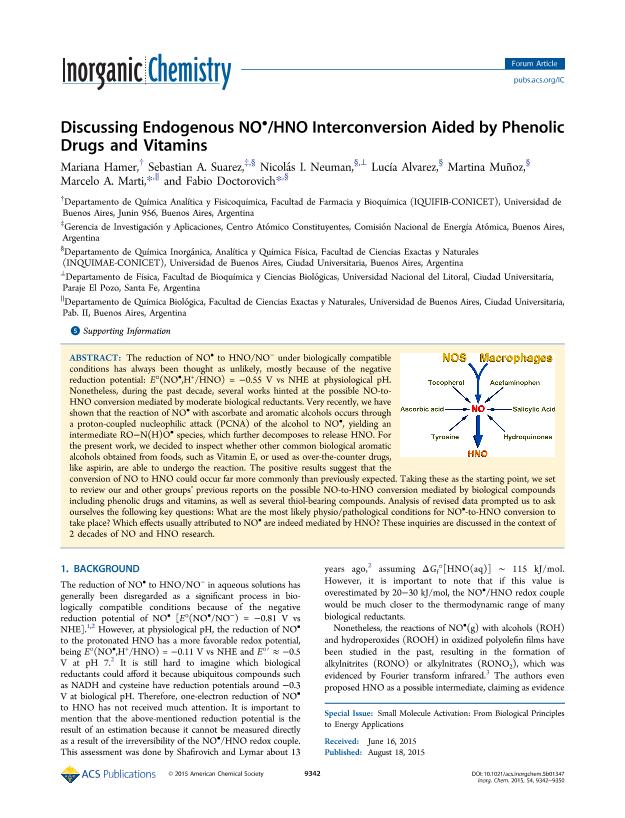Artículo
Discussing Endogenous NO•/HNO Interconversion Aided by Phenolic Drugs and Vitamins
Hamer, Mariana ; Suarez, Sebastian
; Suarez, Sebastian ; Neuman, Nicolás Ignacio
; Neuman, Nicolás Ignacio ; Álvarez, Lucía
; Álvarez, Lucía ; Muñoz, Martina; Marti, Marcelo Adrian
; Muñoz, Martina; Marti, Marcelo Adrian ; Doctorovich, Fabio
; Doctorovich, Fabio
 ; Suarez, Sebastian
; Suarez, Sebastian ; Neuman, Nicolás Ignacio
; Neuman, Nicolás Ignacio ; Álvarez, Lucía
; Álvarez, Lucía ; Muñoz, Martina; Marti, Marcelo Adrian
; Muñoz, Martina; Marti, Marcelo Adrian ; Doctorovich, Fabio
; Doctorovich, Fabio
Fecha de publicación:
08/2015
Editorial:
American Chemical Society
Revista:
Inorganic Chemistry
ISSN:
0020-1669
Idioma:
Inglés
Tipo de recurso:
Artículo publicado
Clasificación temática:
Resumen
The reduction of NO• to HNO/NO- under biologically compatible conditions has always been thought as unlikely, mostly because of the negative reduction potential: E°(NO•,H+/HNO) = -0.55 V vs NHE at physiological pH. Nonetheless, during the past decade, several works hinted at the possible NO-to-HNO conversion mediated by moderate biological reductants. Very recently, we have shown that the reaction of NO• with ascorbate and aromatic alcohols occurs through a proton-coupled nucleophilic attack (PCNA) of the alcohol to NO•, yielding an intermediate RO-N(H)O• species, which further decomposes to release HNO. For the present work, we decided to inspect whether other common biological aromatic alcohols obtained from foods, such as Vitamin E, or used as over-the-counter drugs, like aspirin, are able to undergo the reaction. The positive results suggest that the conversion of NO to HNO could occur far more commonly than previously expected. Taking these as the starting point, we set to review our and other groups' previous reports on the possible NO-to-HNO conversion mediated by biological compounds including phenolic drugs and vitamins, as well as several thiol-bearing compounds. Analysis of revised data prompted us to ask ourselves the following key questions: What are the most likely physio/pathological conditions for NO•-to-HNO conversion to take place? Which effects usually attributed to NO• are indeed mediated by HNO? These inquiries are discussed in the context of 2 decades of NO and HNO research.
Archivos asociados
Licencia
Identificadores
Colecciones
Articulos(INQUIMAE)
Articulos de INST.D/QUIM FIS D/L MATERIALES MEDIOAMB Y ENERGIA
Articulos de INST.D/QUIM FIS D/L MATERIALES MEDIOAMB Y ENERGIA
Citación
Hamer, Mariana; Suarez, Sebastian; Neuman, Nicolás Ignacio; Álvarez, Lucía; Muñoz, Martina; et al.; Discussing Endogenous NO•/HNO Interconversion Aided by Phenolic Drugs and Vitamins; American Chemical Society; Inorganic Chemistry; 54; 19; 8-2015; 9342-9350
Compartir
Altmétricas



